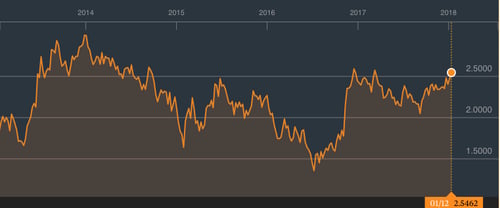 With interest rates rising recently, I have received a number of questions about what that means for our investments. It’s not as simple a question as you might think. As such, it is worth taking some time to think things through.
With interest rates rising recently, I have received a number of questions about what that means for our investments. It’s not as simple a question as you might think. As such, it is worth taking some time to think things through.
Are rates really rising?
First, let’s consider whether rates are really rising. If you look at the following chart of yields on 10-year U.S. Treasuries for the past five years (taken from Bloomberg), you can see that we are still below the highs from 2017. In fact, when we hit those highs, rates came back down again. We have also been around current levels a couple of other times in the past four years, only to see rates subsequently decline. So, there is a real possibility that rates will drop back down. This recent spike may actually mean nothing. If so, no need to do anything.

Source: Bloomberg
Why are rates rising?
Let’s suppose rates do keep rising. The next question is why that is happening, and there are two possibilities. The good reason is that growth is picking up and that rates are rising in response to that, as there is more demand for capital. So, the price of money (i.e., interest rates) is reflecting that. This would actually be positive for stocks. Faster growth leads to rising revenues and valuations, which in turn offset any negative mathematical effects of rising rates.
Historically, this has been the case early in the rate increase cycle, which is where we are now. With rates below about 4 percent, increases have been more about faster growth than about anything else and have been positive for the market. In this case, which looks probable, there is no reason to worry—but quite the opposite—at least for a while.
The bad reason for rates to rise is that inflation is increasing. This would not reflect real growth, but an overheating of the economy, and it would be bad for stocks. The data shows that inflation may be rising slowly, although this is not yet clear and certainly not a problem yet. It may become so during 2018, according to many analysts, but the same was said in 2014, 2015, 2016, and 2017. We will certainly keep an eye out, but the wolf is not at the door just yet, as the most recent inflation data has been quite contained.
For stocks, then, rate increases reflect faster growth and not yet inflation. So this should be good (or at least not bad) for investors.
What about fixed income?
Here, the case is less good, which is not to say bad. As bonds usually pay a fixed coupon payment, they do not benefit from faster growth, so they will lose value as rates rise. At the same time, you now get the ability to reinvest those payments at a higher yield. Overall, you will lose a bit in the short term, as prices adjust, but will be generally even or ahead over time, as work by my colleague Peter Essele has shown. The damage in the short term is real, but so is the benefit. No need to panic either way. That is, of course, if rates actually do keep going up, which, as noted, is hardly certain.
A move toward shorter durations
Here at Commonwealth, we are starting to move our portfolios toward shorter durations, which are less affected by rate increases, but in a measured way. We are preparing for the possibility of higher rates, but we are very aware that now may not be the time. We also know that the benefits of such repositioning are usually not as large as people think. As long-term investors, we are more concerned with those outcomes than with short-term fluctuations.
No need to panic
With current rates, any increases are likely to have minor effects on a diversified portfolio, of either stocks or bonds. There is no need to panic. You can make a case for starting to adjust, but those adjustments probably are not going to be substantial—and don’t really need to be.


 Print
Print

